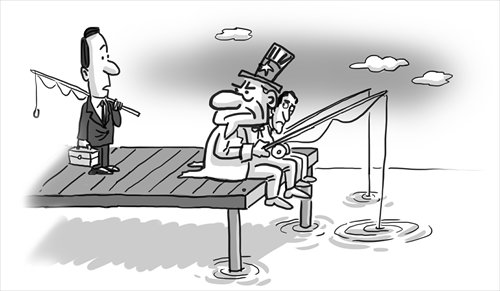


llustration: Liu Rui/GT
Resources, especially oil, are one of the major drives that keep tensions in the South China Sea simmering. As world oil prices remain at low ebb, there are speculations that the South China Sea won't be as eye-catching as before for many stakeholders in the region. But when oil and gas prices drop, is it necessary that the nations involved continue the tit-for-tat fight as they did before?
The rivalries in the South China Sea are due to its potential resources. Real stakeholders won't let go of this strategically important area simply due to a possibly temporary oil price slump.
Tensions in the South China Sea might be eased in 2015, not because of the low oil prices, but due to the strategic shifts laid out by major powers which have crucial interests in this region. Where the conflicts are heading is not decided by the claims of small disputing parties such as Vietnam and the Philippines, but by China and the US.
After years of efforts, the US "pivot to Asia" strategy has entered a phase of consolidation and calibration. The White House is unlikely to make big moves in the South China Sea as long as no emergencies take place. With more progress made in bilateral relations, Washington has realized that too much pressure over Beijing on the South China Sea disputes will not benefit itself in the end.
After all, both countries have seen wider space for cooperation and mutual benefits in many other regional and international issues. A face-off with China in the South China Sea will jeopardize the chance Washington seeks China's cooperation in other issues.
China will continue its policy over the region by aligning sovereignty protection with peacekeeping. Beijing won't give up countering other claimants when they try to further encroach on resources and islands, but it will put more efforts in promoting its "One Belt and One Road" project, which refers to the Silk Road Economic Belt and the 21st Century Maritime Silk Road, seeking cooperation with other regional countries.
As for countries like the Philippines and Vietnam, they have seen China's growing determination in protecting its sovereignty and the declining US enthusiasm to be their patron after the disputes around the Huangyan Island and the oil rig confrontation. In particular, the Philippines, the most aggressive troublemaker in the region, will probably not employ provocative measures as it is the host of this year's APEC forum.
The result of the arbitration case brought by the Philippines to an international court will serve as a critical element that might cause some waves in the South China Sea.
Although China has affirmed its decision not to get involved in the arbitration, the rivalry between both sides will continue in the legal and political spheres. The result is expected to come out at the end of 2015, and meanwhile, the US might put more pressures on China over the legal status of the nine-dash line, which to some extent lends a helping hand to Manila.
Another important factor will be the progress of establishing a code of conduct (COC) among all claimants. ASEAN and China are still involved in a dispute on this matter. Malaysia, which has assumed the rotating presidency of ASEAN for this year, is believed to give it more push.
However, if negotiations cannot work as expected, no one can guarantee some countries won't resort to tricky measures on their own, which will raise the risks.
Some uncertainties in the domestic politics of Vietnam and the Philippines will probably make some impact on the South China Sea issues, as both Hanoi and Manila will see a change of top leadership in 2016. The South China Sea issues may be misused in political struggles.
Complicated as it has been, the South China Sea is going to be peaceful. However, accidents may overturn the trend at any time. Risk control and trust cultivation still need to be highlighted for the greater good.
The author is an associate research fellow at the Institute of International Relations, Shanghai Academy of Social Sciences. opinion@globaltimes.com.cn
 PLA soldiers operating vehicle-mounted guns in drill
PLA soldiers operating vehicle-mounted guns in drill Beauties dancing on the rings
Beauties dancing on the rings Blind carpenter in E China's Jiangxi
Blind carpenter in E China's Jiangxi Top 10 highest-paid sports teams in the world
Top 10 highest-paid sports teams in the world In photos: China's WZ-10 armed helicopters
In photos: China's WZ-10 armed helicopters UFO spotted in several places in China
UFO spotted in several places in China Certificates of land title of Qing Dynasty and Republic of China
Certificates of land title of Qing Dynasty and Republic of China  Cute young Taoist priest in Beijing
Cute young Taoist priest in Beijing New film brings Doraemon's life story to China in 3D
New film brings Doraemon's life story to China in 3D China-S.Korea FTA sets positive precedent
China-S.Korea FTA sets positive precedent Ferry carrying 458 people sinks in Yangtze River
Ferry carrying 458 people sinks in Yangtze River Mecca of Marxism
Mecca of Marxism Bring them home
Bring them homeDay|Week